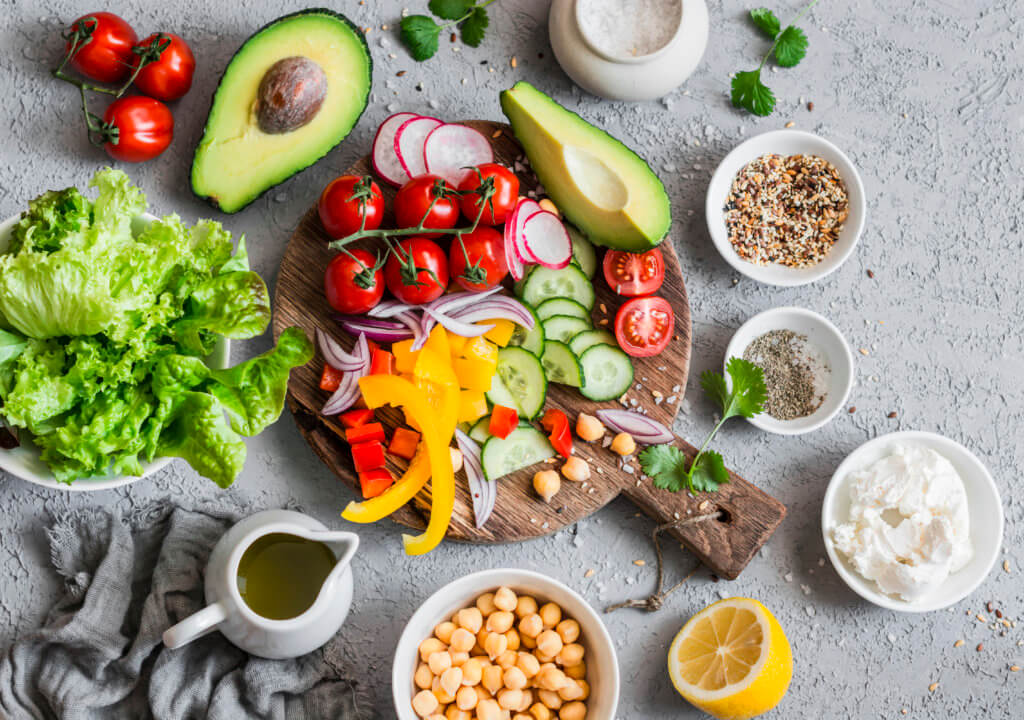Despite how overused the phrase can be, it really is true, you are what you eat.
Your body is a collection of the raw materials you provide. Supply your body with the right amounts of proper macronutrients and micronutrients and your body thrives.
But what are these nutrients? Macro means “large” and micro means “small,” and as you might expect, macronutrients are the ones you need in large amounts and micronutrients are those you need in smaller amounts.
Macronutrients
The macronutrients are carbohydrates, fat, and protein. These nutrients provide fuel, the body’s building blocks, and the various molecules (e.g., hormones, blood) your body needs.
While your body prefers to use carbohydrates (glucose) for fuel, all macronutrients contain energy. However, macronutrients differ in the amount of fuel (calories) they contain. So, if you were to eat equal amounts (grams) of the macronutrients, you would find their calorie content is different:
- 1 gram of carbohydrate = 4 calories
- 1 gram of fat = 9 calories
- 1 gram of protein = 4 calories
Each macronutrient influences our bodies in a different way. Protein and fat help us feel full. Protein is especially important for maintaining lean body mass.
Quality is the most important issue when discussing macronutrients. There are good and bad carbohydrates, proteins, and fats. Follow these basic guidelines to help ensure you are getting the best-quality macronutrients:
- Proteins: Choose lean meats such as fish, turkey, or chicken or lean cuts of beef or pork. Opt for grass-fed and organic when possible. Good plant sources of protein include beans and nuts.
- Carbohydrates: Choose whole, minimally processed grains and plenty of fresh vegetables and fruits.
- Fats: Choose olive oil, canola oil and avocado oil, which contain high amount of mono-unsaturated fatty acids for cooking. Don’t forget the essential fatty acids (e.g., EPA, DHA), which you can get from cold-water fish, but most people need to supplement to get enough.

Micronutrients
The micronutrients are vitamins, minerals, trace elements, phytochemicals, and antioxidants essential for good health. Most of us get enough calories in our diets, but fail to get enough of these micronutrients.
Here are some key sources of micronutrients:
Water-soluble vitamins
Vitamin B1: coenzyme needed for metabolism of carbohydrates and certain amino acids. You can find it in pork, cereals, and dried fruits.
Vitamin B2: coenzyme needed for carbohydrate, protein, and lipid (fat) metabolism. Find it in dairy products, liver, and whole grains.
Vitamin B3 (Niacin): produces coenzymes NAD (nicotinamide adenine dinucleotide) and NADP (nicotinamide adenine dinucleotide phosphate) needed for metabolism. Found in beef, liver, tuna, salmon, poultry, pork, and mushrooms.
Vitamin B6: used in amino acid and fatty acid metabolism and necessary to produce the hormone serotonin. Find it in chicken, liver, and fish.
Vitamin B12: necessary for the formation of red blood cells, nerve conduction, and the breakdown of fatty acids and amino acids. Find it in meat.
Vitamin C: an antioxidant and necessary for collagen formation as well as iron absorption. Find it mostly in fresh fruits: such as citrus fruits, and berriesand also peppers etc.
Folic acid: coenzyme needed for DNA synthesis and amino acid metabolism. Found in liver, dairy products, and egg yolks.
Fat-soluble vitamins
Vitamin A: necessary for the maintenance of skin cells, bone growth, vision and immunity. Find it in liver, meat, fish, egg yolks, and dairy products. Beta-carotene, which is found in many colorful vegetables such as carrots, can also be converted into vitamin A.
Vitamin D: necessary for bone formation and immune and metabolic Find it in milk products and through exposure to sunshine.
Vitamin E: an antioxidant and assists in fertility. Find it in nuts and dark green leafy vegetables.
Vitamin K: essential for blood clotting and bone maintenance. Found in meat, cheese, and green leafy vegetables.
Minerals
Calcium: needed for bone formation and maintenance, muscle contraction, and nerve conduction. Found in dairy products, sardines, and almonds.
Magnesium: necessary for protein synthesis and to maintain healthy blood sugar and blood pressure. Find it in nuts, grains, and greens.
Potassium: needed for proper nerve function and heart rhythm. Found in oranges, bananas, many cereal grains, and beans.
Sodium: essential to water balance and nerve condition. Find it in table salt.
Iron: necessary for blood cell production and immune function. Find it in dark green vegetables and meats.
Getting the right balance of macronutrients and micronutrients can be daunting. You can help ensure you are getting what you need by eating a wide variety of foods and don’t be hesitant to consider supplementing to fill in those nutritional gaps.






